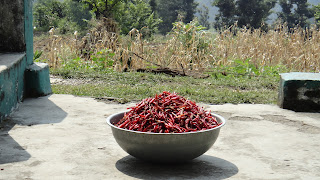One night, walking back to our homestay in Dehradun we were laughing about all the now familiar local quirks and Indian-isms. We confirmed with one another "Today was an Indian day"-- to the core. Yet unconsciously my brain quipped the response, "Today was a good day". The overt association between "good" & "Indian" came naturally.
I can say with certainty that since embarking on this journey I can now better understand and perform rest, that I am less perfecting and more flexible, and that I feel euphorically grateful for every comfort and opportunity I've been blessed with. In the words of an American physician I met in Mussoorie, "Life truly isn't fair, and we've been dealt a good hand."
Dr. Gandhi told us he never donates money to charities, but rather incorporates giving into his daily practice. When patients come to see him who are unable to pay he gives his services gratis, even if that means admitting these people to his inpatient service, & feeding and caring for them there for months if need be.
I really took to this concept, and am approaching my future with a similar vision. From here forward I will never be content to allocate philanthopy to a corner of my life, to collect dust & pick up surplus energies of mine on rare occasions. No one who has lived amongst destitute poverty and looked it in the eye can do so. The need is too great, and the time too urgent. Service will instead be for me a daily aim, and with my medical training in hand I feel I have a tangible skill to offer others.
That night as we lay in bed discussing our goals for the rest of the trip, Sadie offered in her true free-spirited way a resolution of all concrete objectives, instead embracing the CFHI mantra, "Let the world change you." Simplicity only rivaled by truth... and so it has.
I can say with certainty that since embarking on this journey I can now better understand and perform rest, that I am less perfecting and more flexible, and that I feel euphorically grateful for every comfort and opportunity I've been blessed with. In the words of an American physician I met in Mussoorie, "Life truly isn't fair, and we've been dealt a good hand."
I really took to this concept, and am approaching my future with a similar vision. From here forward I will never be content to allocate philanthopy to a corner of my life, to collect dust & pick up surplus energies of mine on rare occasions. No one who has lived amongst destitute poverty and looked it in the eye can do so. The need is too great, and the time too urgent. Service will instead be for me a daily aim, and with my medical training in hand I feel I have a tangible skill to offer others.
That night as we lay in bed discussing our goals for the rest of the trip, Sadie offered in her true free-spirited way a resolution of all concrete objectives, instead embracing the CFHI mantra, "Let the world change you." Simplicity only rivaled by truth... and so it has.

































